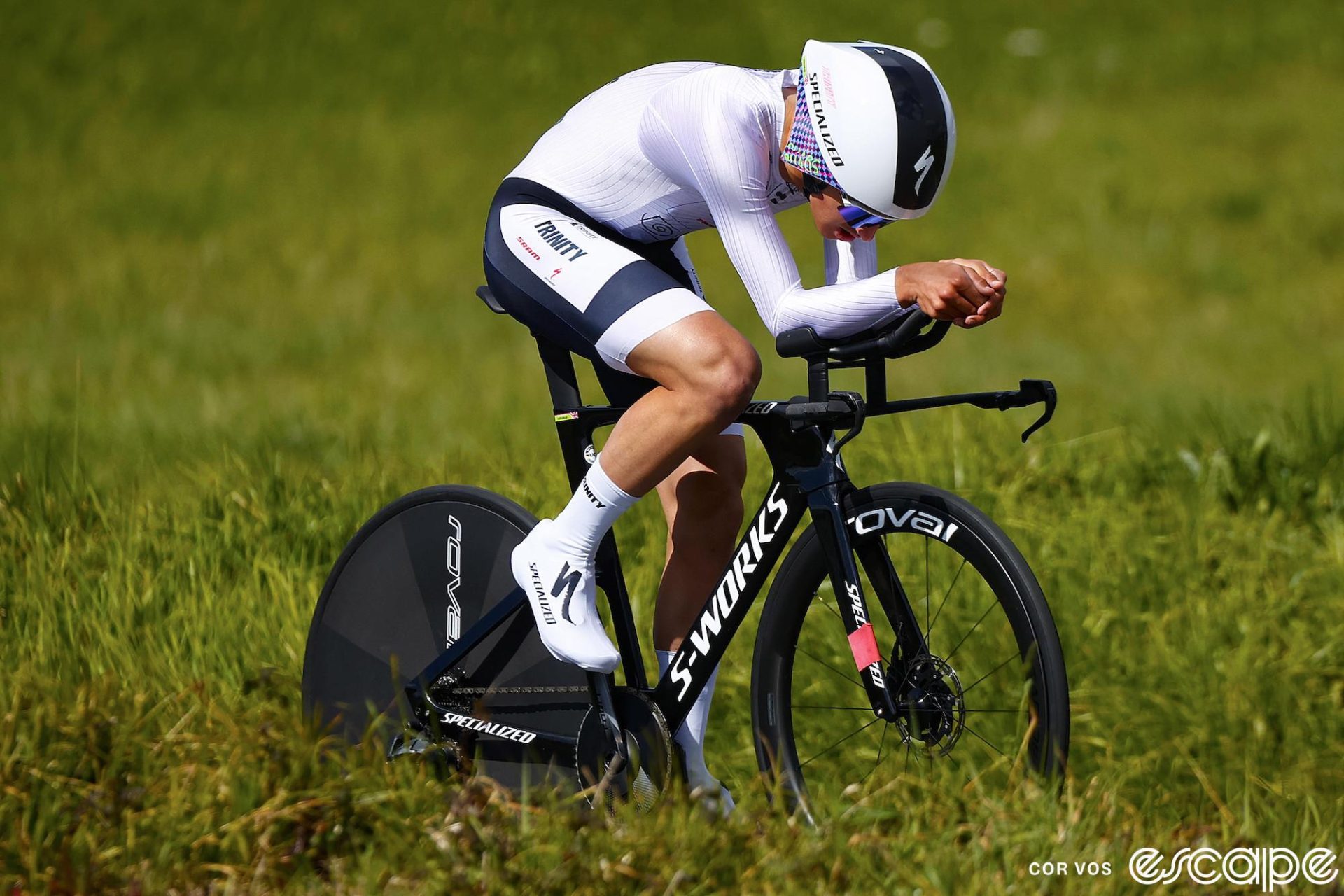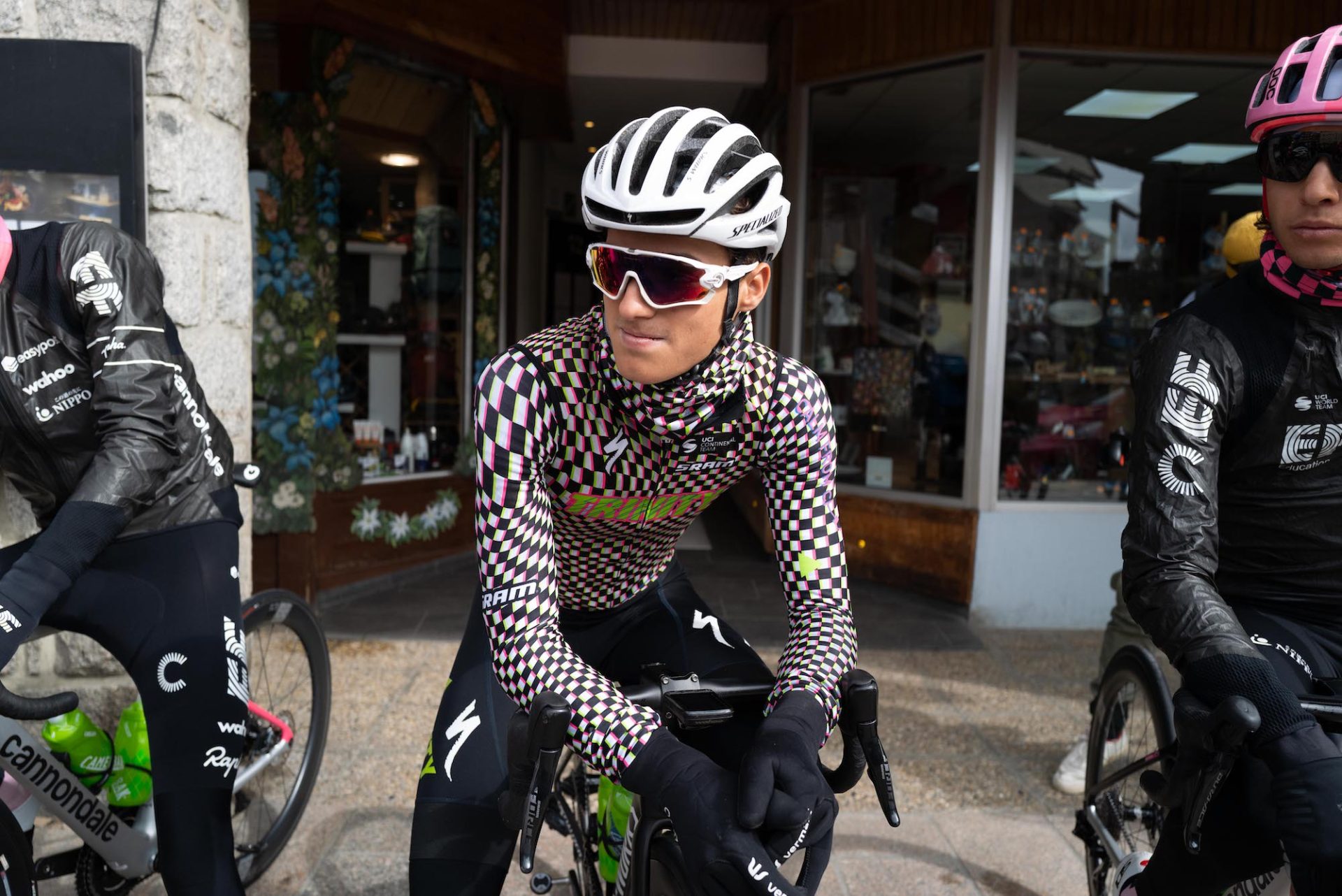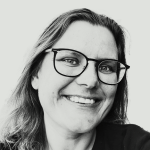The peloton gets younger every year. This was always the case in the women’s peloton for the lack of an U23 category but more and more male teens seem to aim to make their stint in the U23 ranks as short as possible, or non-existent. Examples – from Remco Evenepoel to Ineos Grenadiers’ latest 18-year-old signee, AJ August – abound. Lukas Nerurkar only spent two years as a U23-rider but left a big impression in these years with Trinity Racing. In 2024 he joins EF Education–EasyPost. Time to get to know the young Brit with roots in Ethiopia.
I speak to Lukas in Girona where he has been living for a year now. The biggest question on my mind is how to pronounce his name. So, to do myself a favor and help fellow journalists and commentators out for the near future, here is a sound file.
Back to Girona. “I moved here after completing my school exams last year,” Lukas explains. For him the draw is social and logistical. “The terrain here is not super special. There are more places where you have good riding and good weather but Girona is just a nice place to be, especially as a young athlete,” he says. “You have more riders who live here and they attract more riders too. You quickly meet new people to train with. It’s also a small city. As a young cyclist it’s easy to find a place and it’s close to airports. Everything is walkable which is a big factor because I don’t have a car.”
It's not the first time the 19-year-old has lived abroad. He was born in the United Kingdom but when he was just a few weeks old returned home to Ethiopia where he lived until he was seven.
“My father [Olympic marathon and 10k runner Richard Nerurkar] had always loved the atmosphere in Africa so after he ended his active career he moved there. My mum travelled back to the UK to have me but then returned to Addis Ababa. She is a doctor and worked on a project there and my dad set up a running center,” Lukas explains.
It was in the hills above the Ethiopian capital city that he fell in love with the bike, which was quite unexpected in a family where running was the go-to sport, not only for his dad but also for his mother Gail and his sister.
“Friends brought a bike and some cycling kit from the UK. It’s very hard to get these in Ethiopia. My dad used to take me out to the mountains and we did ride around there. I liked it because you can go faster and further than running. When I was four or five, I already could do 10 or 15 kilometers and explore. On running shoes, you can maybe do three? The world was a lot bigger on a bike for me as a boy.”
In Ethiopia he attended a German school and learned the language before returning to the UK when he was seven. The family moved to Brighton where Lukas joined the team of Preston Park.
“When I first started racing at Preston Park it was around the Olympic boom [2012] so I was looking at riders like Chris Hoy and Jason Kenny, but the biggest was Bradley Wiggins who won the Olympics and the Tour de France. Everyone around then was looking up to him to a certain degree. When I moved to VC Londres [club team] as a junior I looked up to former VCL riders like Fred Wright and Ethan Hayter or riders closer to my age like Tom Gloag. I could see their career path and saw that you can reach that too if you do things right.”

Being a junior in the COVID years of 2020 and 2021 Nerurkar didn’t race all that much but his talent was clear. He joined the team of Trinity Racing, led by former pro turned sports director Peter Kennaugh, in 2022. Many of its riders made their way to the WorldTour, or will in 2024, including Tom Pidcock, Ben Healy, Tom Gloag, Luke Lamperti, Blake Quick, Rudy Porter, Ben Turner, Sam Watson, Alexander Hajek and Finlay Pickering. The team also featured cyclocross and mountain biker Cameron Mason until this year.
Nerurkar himself first came to prominence and on the radar of the pro teams in the O Gran Camiño in February. This stage race in Spanish Galicia was hampered by snow and cold. It was also dominated by Jonas Vingegaard. Nerurkar was eighth on the first uphill finish, behind WorldTour and ProTeam riders. With a white jersey for best young rider and a sixth place on the general classification behind five WorldTour pros, he sure made heads turn.
“I started talking with EF Education-EasyPost after the Camiño. I went on a camp with them and met them. For me it’s a good thing to have the freedom to do more races. On a dominant team like Jumbo-Visma you might not be racing all that much. At EF they do a lot of smaller races where I can try to win. Also, this is an English-speaking team and I don’t speak any other languages. Getting along with teammates and communicating with them is important as a neo-pro.”
Nerurkar turns 20 in November but is by no means an exception when it comes to turning pro young. Riders are being signed straight from juniors so a two-year period in the U23 ranks even seems long to current standards.
“Things are going fast in my career. When I talked with Pete [Kennaugh] earlier this year we were outlining what the goals were. I wanted to feel comfortable in my age group first. After last year when I didn’t race that much, I felt I hadn’t found my footing in this category yet. This year I wanted to reach that goal and maybe win some races although I thought I couldn’t just yet. After Camiño and some big U23 races I felt it was good to step up. It moved quickly but at the same time it didn’t feel like anything was rushed. It doesn’t feel like a big jump.”
After the Gran Camiño, Nerurkar’s program was focused on the main U23 races. He won stages in the Orlen Nations Gran Prix and the Giro Next Gen and came close to winning one in the Tour de l’Avenir too. He showed his versatility on mixed terrain but also as a teammate doing leadouts for Luke Lamperti, who turns pro with Soudal Quick-Step in 2024. It helped him figure out what kind of rider he wants to become because that’s not clear yet, also because he didn’t race many days. That’s all to be discovered in his first pro year.
“I haven’t really done all that many days as an U23 rider. I had A-level exams last year and this year I was out with a knee injury and couldn’t do races like Liège-Bastogne-Liège which was a big shame.
“In my first year as a pro, it’s all about race experience and then build from that. That can be any experience, in my opinion. I even want to do some [cobbled] classics because you don’t know if you are suited for a race before you try. I don’t know what kind of rider I am. I want to find out and so does the team,” Nerurkar explains.
“For example, I did a lot of leadouts for Luke. You know with a sprinter like him that if you lead him out, there is a big chance he wins so it’s very rewarding. At the start of the year, we did the Volta Alentejo and he won on the first day. I have been learning so much from riding with Luke because he is so skilled. That positioning will help me in the future too. You never know when it will come in handy,” he smiles.
Nerurkar continues to discuss his development plans, citing one of EF’s own prodigious talents. “In his first year Ben Healy showed a few glimpses of his talent, but he was just learning every race. In his second year he was able to use that experience and step up. I don’t know if I will do the 50 kilometers solo but winning from a breakaway is something that would suit me.”
Nerurkar is an eloquent, intelligent young man who knows what he wants to achieve, but he also knows what a top sports career is about. Although he wasn’t born when his father Richard had his successes, father and son do talk about their mutual experiences.
“My dad taught me to be patient. From last year to this year, I don’t feel like I changed that much. However, the results have been massively different. I guess it’s easy to be discouraged when you have a setback like I had in the U16 or juniors. He taught me to be patient and do the right things. Then everything will fall into place eventually. In his own career he needed that patience too. As a kid he wasn’t the best in the country but he moved up when he was in university and after that. Then he ran against the best of the world.”
Cycling is a new universe for the Nerurkar family where athletics were prevalent. Making progress in the sport doesn’t only enrich Lukas’ life but also his family’s when they come to watch races like the Giro Next Gen, where Lukas was one of the favorites for a good result in the overall classification.
“I had a bad day on Stelvio [where he lost the GC] and my dad was there. I won the day after and he was there too. That was a pretty special moment for both of us. For my parents this is a new sport. My dad has his eyes opened with the number of hours cyclists do. Also, the nuances of my sport. In a marathon it’s more about being the strongest whereas cycling is more technical and more skilled. You also have the risk of crashing in cycling a lot more than running,” he explains.
Another big difference is the value given to the Olympic Games between cycling and athletics.
“For me the Olympics don’t have the same value as they have in athletics, or to my dad. I think our Olympics are the Tour de France with its global audience. All cyclists watch that race. My bigger aim would be the Tour but yes, the Olympics are amazing too. I definitely wouldn’t turn them down,” he smiles.
The 2024 season will be a big year for the young British rider. He turned down a spot at Imperial London University to focus on his cycling career full time.
“I was accepted for Physics at Imperial but I said no. I am busy enough as it is. I am riding a bike full-time and everything is new. I don’t feel like I should be doing anything extra. I will keep occupied but pursuing a degree is a bit too much now,” he says.
“Although some of my training will change next year, I don’t think the volume will be that much different. I trained full time this year already. I am now looking for consistency in my training and racing. That is an important goal next year, to find that consistency. Crashes and illness are a lottery but staying consistent is my aim.”
Races like Il Lombardia, where he finished ninth in the U23 version, Strade Bianche, or Liège-Bastogne-Liège would be a dream for next season but Nerurkar is realistic as well as ambitious.
“I would love to win a race. It doesn’t matter which one but to win one for the team next year would be massive. It’s a massive, ambitious goal but I would like that. Liège is my dream race to debut in next year too. I also love Lombardia and Strade. I haven’t done any of these obviously but I love watching these a lot.”
Nerurkar is one of the exciting new riders to watch in 2024. From the hills above Addis Ababa to the brightly colored jersey of EF Education-EasyPost, the young Brit is ready to take all the experiences on and off the bike in.
“I love the variety of people you meet on the bike. This is a true team sport where you empathize with so many people like teammates but also the staff. That’s so important and I hope to learn so much more at EF next year. As a 12-year-old I would have been thrilled with getting all the kit you get as a pro. Now I look forward to learning about this sport and meet people from all over the world. I only just started. I just hope that the bike will keep giving me the freedom I experienced when I was four years old,” he concludes.
Did we do a good job with this story?


